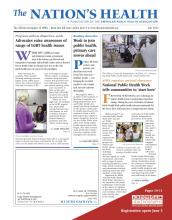As a parent, you may have a billion and one errands to do with a small child in tow.
With all your responsibilities, you may forget that your child fell asleep in the backseat of the car as you head into the grocery store, or think you already dropped your child off at preschool.
While it’s never safe to leave a small child unattended, on a hot day, such a mistake could cost a life. It doesn’t take long for a child to die while left inside a hot vehicle. Heat stroke is a leading cause of vehicle-related death for children, says Rebecca Noe, MN, MPH, FNP-BC, an epidemiologist with the Centers for Disease Control and Prevention’s National Center for Environmental Health.
And it doesn’t take a very hot day to pose a threat: When temperatures are in the 60s, a car can heat up to more than 110 degrees, according to the National Highway Traffic Safety Administration.
Parents should never leave their children alone in a car. Rolling a window down or leaving the air conditioning on while the motor runs is not enough to keep them safe.
Noe says parents may not realize that young children can’t express they are too hot or thirsty, and “often they don’t have the awareness of how to cool themselves off,” Noe says, which can lead to heat stroke.
If you see a child in a car who may be suffering from heat stroke, you should immediately remove the child from the vehicle and take her or him into a nearby air-conditioned building, Noe says. If you can’t open the car, call the police immediately.
“If you notice that the child is either lethargic or unresponsive then of course you want to call 911,” Noe says. “But while you’re waiting you can also cool the child down by pouring cold water over them or fanning them. You definitely just want to get them out of the hot environment as soon as possible.”
Sometimes when kids are left behind in cars it’s because parents have forgotten they are there. Luckily, there are steps you can take to remind yourself. Among them:
Make a habit of checking your vehicle from front to back before you lock the door and leave your vehicle.
Place something you know you’ll need, such as a purse or briefcase, in the back seat of the car, so you’ll remember to see your child there too.
Leave a note in your car where you know you’ll check it before leaving.
Leaving a child behind in a car in the heat is “a very tragic situation and it’s clearly very preventable,” Noe says.

mom and baby, Aabejon
Noe says it’s also important to ask your child care provider to call you if your child does not show up for care, because in some cases, a child may be left in a vehicle or bus carrying many children.
“Make sure you know where your child is and if they’re expecting them that they call you if they’re not there,” Noe says.
The risk of hot car death is just as high when children have access to unlocked car doors in your driveway or parking lot. Noe says it’s important to teach your kids to not play in or around cars. Make sure to keep your car doors and trunk locked and to store your car keys so they’re out of your child’s reach.
Furry family members inside a hot car are in just as much danger as your kids. Your pets could suffer organ damage or die after being left in a hot vehicle, according to the Humane Society of the United States. Call the police or a shelter if you see an animal that may be suffering from the heat inside a parked vehicle.
What happens during heat stroke?
Heat stroke occurs when your body can’t control its temperature, which can rise to 106 degrees or higher within 10 to 15 minutes, says CDC. Young kids are at high risk because their bodies heat up quickly. When a child’s temperature reaches 107 degrees, it can be fatal, says NHTSA. On average, one child dies every 10 days in the U.S. due to heat stroke after being left unattended inside of a car, according to Safe Kids Worldwide.
Signs that someone may be suffering a heat stroke are dizziness, a rapid pulse and skin that is hot and dry without signs of sweat.
To learn more about car safety and heat stroke, visit www.safercar.gov/parents/heatstroke.htm
- Copyright The Nation’s Health, American Public Health Association









